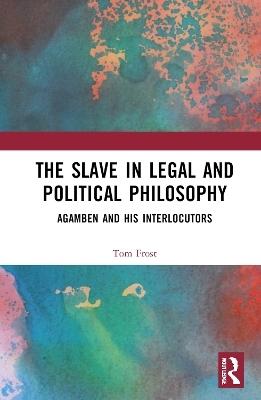
The Slave in Legal and Political Philosophy
Agamben and His Interlocutors
Seiten
2025
Routledge (Verlag)
978-1-032-30127-3 (ISBN)
Routledge (Verlag)
978-1-032-30127-3 (ISBN)
- Noch nicht erschienen (ca. Februar 2025)
- Versandkostenfrei innerhalb Deutschlands
- Auch auf Rechnung
- Verfügbarkeit in der Filiale vor Ort prüfen
- Artikel merken
This book explores how the figure of the slave has been used to construct ideas of freedom in Western political and legal philosophy.
The figure of the slave has supported philosophical and legal defences of colonialism, coloniality and the supremacy of the white subject. Yet for Giorgio Agamben, the slave stands (almost counterintuitively) as an exemplar of a potential form of future positive political existence. Developing this line of thought, the book reads key thinkers Agamben engages with in his thought and writings – including Aristotle, Saint Paul and G W F Hegel – and draws on decolonial theory to argue that the lives of people who were enslaved and unfree, and their actions and gestures, can point towards a paradigmatic form of political belonging. By reading Agamben in a decolonial direction, we can imagine alternative forms of agency, recognition and subjectivity, which can challenge the necropolitical world of racial capitalism in which we live.
This study will appeal to scholars, researchers and graduate students with an interest in the thought of Giorgio Agamben, radical politics, legal and political philosophy and decolonial theory.
The figure of the slave has supported philosophical and legal defences of colonialism, coloniality and the supremacy of the white subject. Yet for Giorgio Agamben, the slave stands (almost counterintuitively) as an exemplar of a potential form of future positive political existence. Developing this line of thought, the book reads key thinkers Agamben engages with in his thought and writings – including Aristotle, Saint Paul and G W F Hegel – and draws on decolonial theory to argue that the lives of people who were enslaved and unfree, and their actions and gestures, can point towards a paradigmatic form of political belonging. By reading Agamben in a decolonial direction, we can imagine alternative forms of agency, recognition and subjectivity, which can challenge the necropolitical world of racial capitalism in which we live.
This study will appeal to scholars, researchers and graduate students with an interest in the thought of Giorgio Agamben, radical politics, legal and political philosophy and decolonial theory.
Tom Frost is a Senior Lecturer at Kent Law School, UK.
Why the Enslaved? 1. Slavery and the Coming Politics 2. The Potential of Resistance 3. Aristotle’s Slave 4. St Paul, Messianic Time and the Power of the Example 5. The Master-Slave Dialectic and the Enslaved 6. Racial Capitalism and Decoloniality 7. The Gestures of the Body 8. The Way Forward
| Erscheint lt. Verlag | 18.2.2025 |
|---|---|
| Verlagsort | London |
| Sprache | englisch |
| Maße | 156 x 234 mm |
| Themenwelt | Geschichte ► Teilgebiete der Geschichte ► Wirtschaftsgeschichte |
| Geisteswissenschaften ► Philosophie | |
| ISBN-10 | 1-032-30127-9 / 1032301279 |
| ISBN-13 | 978-1-032-30127-3 / 9781032301273 |
| Zustand | Neuware |
| Haben Sie eine Frage zum Produkt? |
Mehr entdecken
aus dem Bereich
aus dem Bereich


